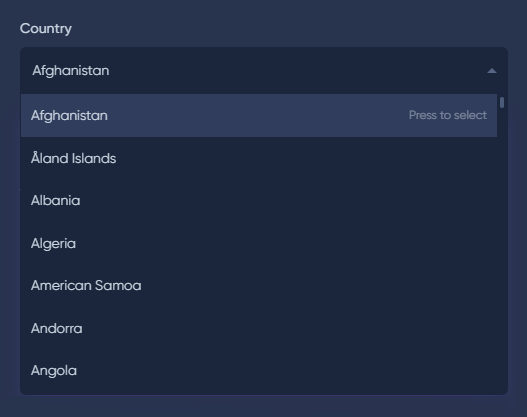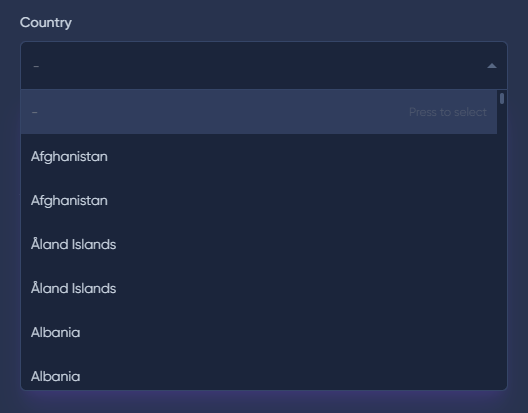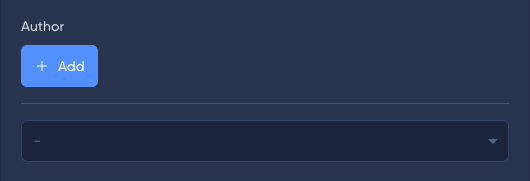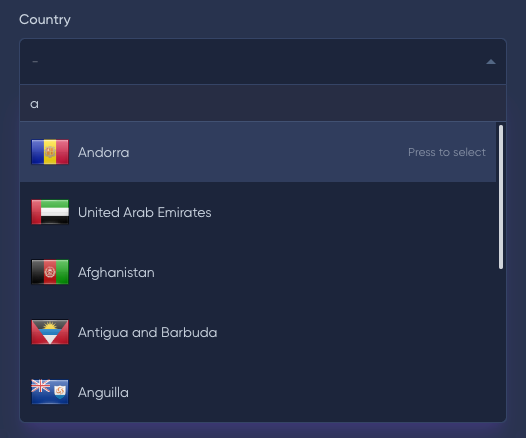The BelongsTo field is designed to work with the same-name relationship in Laravel and includes all Basic Methods.
BelongsTo::make(
Closure|string $label,
?string $relationName = null,
Closure|string|null $formatted = null,
ModelResource|string|null $resource = null,
)
BelongsTo::make(
Closure|string $label,
?string $relationName = null,
Closure|string|null $formatted = null,
ModelResource|string|null $resource = null,
)
BelongsTo::make(
Closure|string $label,
?string $relationName = null,
Closure|string|null $formatted = null,
ModelResource|string|null $resource = null,
)
BelongsTo::make(
Closure|string $label,
?string $relationName = null,
Closure|string|null $formatted = null,
ModelResource|string|null $resource = null,
)
BelongsTo::make(
Closure|string $label,
?string $relationName = null,
Closure|string|null $formatted = null,
ModelResource|string|null $resource = null,
)
$label - the label, the title of the field,$relationName - the name of the relation,$formatted - a closure or field in the related table for displaying values,$resource - the ModelResource that the relationship refers to.
Having a ModelResource that the relationship refers to is mandatory.
The resource must also be registered in the MoonShineServiceProvider service provider in the $core->resources() method.
Otherwise, there will be a 500 error.
use App\MoonShine\Resources\UserResource;
use MoonShine\Laravel\Fields\Relationships\BelongsTo;
BelongsTo::make(
'User',
'user',
resource: UserResource::class
)
namespaces
use App\MoonShine\Resources\UserResource;
use MoonShine\Laravel\Fields\Relationships\BelongsTo;
BelongsTo::make(
'User',
'user',
resource: UserResource::class
)
use App\MoonShine\Resources\UserResource;
use MoonShine\Laravel\Fields\Relationships\BelongsTo;
BelongsTo::make(
'User',
'user',
resource: UserResource::class
)
namespaces
use App\MoonShine\Resources\UserResource;
use MoonShine\Laravel\Fields\Relationships\BelongsTo;
BelongsTo::make(
'User',
'user',
resource: UserResource::class
)
use App\MoonShine\Resources\UserResource;
use MoonShine\Laravel\Fields\Relationships\BelongsTo;
BelongsTo::make(
'User',
'user',
resource: UserResource::class
)


You can omit $resource if the ModelResource matches the relationship name.
use MoonShine\Laravel\Fields\Relationships\BelongsTo;
BelongsTo::make('User', 'user')
use MoonShine\Laravel\Fields\Relationships\BelongsTo;
BelongsTo::make('User', 'user')
use MoonShine\Laravel\Fields\Relationships\BelongsTo;
BelongsTo::make('User', 'user')
use MoonShine\Laravel\Fields\Relationships\BelongsTo;
BelongsTo::make('User', 'user')
use MoonShine\Laravel\Fields\Relationships\BelongsTo;
BelongsTo::make('User', 'user')
If you do not specify $relationName, the name of the relationship will be determined automatically based on $label (by camelCase rules).
use MoonShine\Laravel\Fields\Relationships\BelongsTo;
BelongsTo::make('User')
use MoonShine\Laravel\Fields\Relationships\BelongsTo;
BelongsTo::make('User')
use MoonShine\Laravel\Fields\Relationships\BelongsTo;
BelongsTo::make('User')
use MoonShine\Laravel\Fields\Relationships\BelongsTo;
BelongsTo::make('User')
use MoonShine\Laravel\Fields\Relationships\BelongsTo;
BelongsTo::make('User')
By default, the field used to display the value is the one specified by the $column property in the ModelResource.
The $formatted argument allows overriding the $column property.
use MoonShine\Laravel\Fields\Relationships\BelongsTo;
BelongsTo::make(
'User',
'user',
formatted: 'first_name'
)
use MoonShine\Laravel\Fields\Relationships\BelongsTo;
BelongsTo::make(
'User',
'user',
formatted: 'first_name'
)
use MoonShine\Laravel\Fields\Relationships\BelongsTo;
BelongsTo::make(
'User',
'user',
formatted: 'first_name'
)
use MoonShine\Laravel\Fields\Relationships\BelongsTo;
BelongsTo::make(
'User',
'user',
formatted: 'first_name'
)
use MoonShine\Laravel\Fields\Relationships\BelongsTo;
BelongsTo::make(
'User',
'user',
formatted: 'first_name'
)
If you need to specify a more complex value for display, you can pass a callback function to the $formatted argument.
use MoonShine\Laravel\Fields\Relationships\BelongsTo;
BelongsTo::make(
'Country',
'country',
fn($item) => "$item->id. $item->title"
)
use MoonShine\Laravel\Fields\Relationships\BelongsTo;
BelongsTo::make(
'Country',
'country',
fn($item) => "$item->id. $item->title"
)
use MoonShine\Laravel\Fields\Relationships\BelongsTo;
BelongsTo::make(
'Country',
'country',
fn($item) => "$item->id. $item->title"
)
use MoonShine\Laravel\Fields\Relationships\BelongsTo;
BelongsTo::make(
'Country',
'country',
fn($item) => "$item->id. $item->title"
)
use MoonShine\Laravel\Fields\Relationships\BelongsTo;
BelongsTo::make(
'Country',
'country',
fn($item) => "$item->id. $item->title"
)
If you need to change the column when working with models, use the onAfterFill() method.
use App\MoonShine\Resources\CategoryResource;
use MoonShine\Laravel\Fields\Relationships\BelongsTo;
BelongsTo::make(
'Category',
resource: CategoryResource::class
)
->afterFill(
fn($field) => $field->setColumn('changed_category_id')
)
namespaces
use App\MoonShine\Resources\CategoryResource;
use MoonShine\Laravel\Fields\Relationships\BelongsTo;
BelongsTo::make(
'Category',
resource: CategoryResource::class
)
->afterFill(
fn($field) => $field->setColumn('changed_category_id')
)
use App\MoonShine\Resources\CategoryResource;
use MoonShine\Laravel\Fields\Relationships\BelongsTo;
BelongsTo::make(
'Category',
resource: CategoryResource::class
)
->afterFill(
fn($field) => $field->setColumn('changed_category_id')
)
namespaces
use App\MoonShine\Resources\CategoryResource;
use MoonShine\Laravel\Fields\Relationships\BelongsTo;
BelongsTo::make(
'Category',
resource: CategoryResource::class
)
->afterFill(
fn($field) => $field->setColumn('changed_category_id')
)
use App\MoonShine\Resources\CategoryResource;
use MoonShine\Laravel\Fields\Relationships\BelongsTo;
BelongsTo::make(
'Category',
resource: CategoryResource::class
)
->afterFill(
fn($field) => $field->setColumn('changed_category_id')
)
You can use the default() method if you need to specify a default value for the field.
default(mixed $default)
default(mixed $default)
default(mixed $default)
default(mixed $default)
default(mixed $default)
You must pass a model object as the default value.
use App\MoonShine\Resources\CategoryResource;
use MoonShine\Laravel\Fields\Relationships\BelongsTo;
BelongsTo::make('Country', resource: CategoryResource::class)
->default(Country::find(1))
namespaces
use App\MoonShine\Resources\CategoryResource;
use MoonShine\Laravel\Fields\Relationships\BelongsTo;
BelongsTo::make('Country', resource: CategoryResource::class)
->default(Country::find(1))
use App\MoonShine\Resources\CategoryResource;
use MoonShine\Laravel\Fields\Relationships\BelongsTo;
BelongsTo::make('Country', resource: CategoryResource::class)
->default(Country::find(1))
namespaces
use App\MoonShine\Resources\CategoryResource;
use MoonShine\Laravel\Fields\Relationships\BelongsTo;
BelongsTo::make('Country', resource: CategoryResource::class)
->default(Country::find(1))
use App\MoonShine\Resources\CategoryResource;
use MoonShine\Laravel\Fields\Relationships\BelongsTo;
BelongsTo::make('Country', resource: CategoryResource::class)
->default(Country::find(1))
As with all fields, if you need to store NULL, you should add the nullable() method.
nullable(Closure|bool|null $condition = null)
nullable(Closure|bool|null $condition = null)
nullable(Closure|bool|null $condition = null)
nullable(Closure|bool|null $condition = null)
nullable(Closure|bool|null $condition = null)
use App\MoonShine\Resources\CategoryResource;
use MoonShine\Laravel\Fields\Relationships\BelongsTo;
BelongsTo::make('Country', resource: CategoryResource::class)
->nullable()
namespaces
use App\MoonShine\Resources\CategoryResource;
use MoonShine\Laravel\Fields\Relationships\BelongsTo;
BelongsTo::make('Country', resource: CategoryResource::class)
->nullable()
use App\MoonShine\Resources\CategoryResource;
use MoonShine\Laravel\Fields\Relationships\BelongsTo;
BelongsTo::make('Country', resource: CategoryResource::class)
->nullable()
namespaces
use App\MoonShine\Resources\CategoryResource;
use MoonShine\Laravel\Fields\Relationships\BelongsTo;
BelongsTo::make('Country', resource: CategoryResource::class)
->nullable()
use App\MoonShine\Resources\CategoryResource;
use MoonShine\Laravel\Fields\Relationships\BelongsTo;
BelongsTo::make('Country', resource: CategoryResource::class)
->nullable()


Don't forget to specify in the database table that the field can accept a Null value.
The placeholder() method allows you to set the placeholder attribute for the field.
placeholder(string $value)
placeholder(string $value)
placeholder(string $value)
placeholder(string $value)
placeholder(string $value)
use MoonShine\Laravel\Fields\Relationships\BelongsTo;
BelongsTo::make('Country', 'country')
->nullable()
->placeholder('Country')
use MoonShine\Laravel\Fields\Relationships\BelongsTo;
BelongsTo::make('Country', 'country')
->nullable()
->placeholder('Country')
use MoonShine\Laravel\Fields\Relationships\BelongsTo;
BelongsTo::make('Country', 'country')
->nullable()
->placeholder('Country')
use MoonShine\Laravel\Fields\Relationships\BelongsTo;
BelongsTo::make('Country', 'country')
->nullable()
->placeholder('Country')
use MoonShine\Laravel\Fields\Relationships\BelongsTo;
BelongsTo::make('Country', 'country')
->nullable()
->placeholder('Country')
If you need to search among values, you must add the searchable() method.
use App\MoonShine\Resources\CountryResource;
use MoonShine\Laravel\Fields\Relationships\BelongsTo;
BelongsTo::make('Country', 'country', resource: CountryResource::class)
->searchable()
namespaces
use App\MoonShine\Resources\CountryResource;
use MoonShine\Laravel\Fields\Relationships\BelongsTo;
BelongsTo::make('Country', 'country', resource: CountryResource::class)
->searchable()
use App\MoonShine\Resources\CountryResource;
use MoonShine\Laravel\Fields\Relationships\BelongsTo;
BelongsTo::make('Country', 'country', resource: CountryResource::class)
->searchable()
namespaces
use App\MoonShine\Resources\CountryResource;
use MoonShine\Laravel\Fields\Relationships\BelongsTo;
BelongsTo::make('Country', 'country', resource: CountryResource::class)
->searchable()
use App\MoonShine\Resources\CountryResource;
use MoonShine\Laravel\Fields\Relationships\BelongsTo;
BelongsTo::make('Country', 'country', resource: CountryResource::class)
->searchable()
The creatable() method allows you to create a new relation object via a modal window.
creatable(
Closure|bool|null $condition = null,
?ActionButton $button = null,
)
creatable(
Closure|bool|null $condition = null,
?ActionButton $button = null,
)
creatable(
Closure|bool|null $condition = null,
?ActionButton $button = null,
)
creatable(
Closure|bool|null $condition = null,
?ActionButton $button = null,
)
creatable(
Closure|bool|null $condition = null,
?ActionButton $button = null,
)
BelongsTo::make('Author', resource: AuthorResource::class)
->creatable()
BelongsTo::make('Author', resource: AuthorResource::class)
->creatable()
BelongsTo::make('Author', resource: AuthorResource::class)
->creatable()
BelongsTo::make('Author', resource: AuthorResource::class)
->creatable()
BelongsTo::make('Author', resource: AuthorResource::class)
->creatable()


You can customize the create button by passing the button parameter to the method.
use App\MoonShine\Resources\AuthorResource;
use MoonShine\Laravel\Fields\Relationships\BelongsTo;
use MoonShine\UI\Components\ActionButton;
BelongsTo::make('Author', resource: AuthorResource::class)
->creatable(
button: ActionButton::make('Custom button', '')
)
namespaces
use App\MoonShine\Resources\AuthorResource;
use MoonShine\Laravel\Fields\Relationships\BelongsTo;
use MoonShine\UI\Components\ActionButton;
BelongsTo::make('Author', resource: AuthorResource::class)
->creatable(
button: ActionButton::make('Custom button', '')
)
use App\MoonShine\Resources\AuthorResource;
use MoonShine\Laravel\Fields\Relationships\BelongsTo;
use MoonShine\UI\Components\ActionButton;
BelongsTo::make('Author', resource: AuthorResource::class)
->creatable(
button: ActionButton::make('Custom button', '')
)
namespaces
use App\MoonShine\Resources\AuthorResource;
use MoonShine\Laravel\Fields\Relationships\BelongsTo;
use MoonShine\UI\Components\ActionButton;
BelongsTo::make('Author', resource: AuthorResource::class)
->creatable(
button: ActionButton::make('Custom button', '')
)
use App\MoonShine\Resources\AuthorResource;
use MoonShine\Laravel\Fields\Relationships\BelongsTo;
use MoonShine\UI\Components\ActionButton;
BelongsTo::make('Author', resource: AuthorResource::class)
->creatable(
button: ActionButton::make('Custom button', '')
)
The valuesQuery() method allows you to change the query to retrieve values.
valuesQuery(Closure $callback)
valuesQuery(Closure $callback)
valuesQuery(Closure $callback)
valuesQuery(Closure $callback)
valuesQuery(Closure $callback)
use App\MoonShine\Resources\CategoryResource;
use Illuminate\Contracts\Database\Eloquent\Builder;
use MoonShine\Laravel\Fields\Relationships\BelongsTo;
use MoonShine\UI\Fields\Field;
BelongsTo::make('Category', 'category', resource: CategoryResource::class)
->valuesQuery(fn(Builder $query, Field $field) => $query->where('active', true))
namespaces
use App\MoonShine\Resources\CategoryResource;
use Illuminate\Contracts\Database\Eloquent\Builder;
use MoonShine\Laravel\Fields\Relationships\BelongsTo;
use MoonShine\UI\Fields\Field;
BelongsTo::make('Category', 'category', resource: CategoryResource::class)
->valuesQuery(fn(Builder $query, Field $field) => $query->where('active', true))
use App\MoonShine\Resources\CategoryResource;
use Illuminate\Contracts\Database\Eloquent\Builder;
use MoonShine\Laravel\Fields\Relationships\BelongsTo;
use MoonShine\UI\Fields\Field;
BelongsTo::make('Category', 'category', resource: CategoryResource::class)
->valuesQuery(fn(Builder $query, Field $field) => $query->where('active', true))
namespaces
use App\MoonShine\Resources\CategoryResource;
use Illuminate\Contracts\Database\Eloquent\Builder;
use MoonShine\Laravel\Fields\Relationships\BelongsTo;
use MoonShine\UI\Fields\Field;
BelongsTo::make('Category', 'category', resource: CategoryResource::class)
->valuesQuery(fn(Builder $query, Field $field) => $query->where('active', true))
use App\MoonShine\Resources\CategoryResource;
use Illuminate\Contracts\Database\Eloquent\Builder;
use MoonShine\Laravel\Fields\Relationships\BelongsTo;
use MoonShine\UI\Fields\Field;
BelongsTo::make('Category', 'category', resource: CategoryResource::class)
->valuesQuery(fn(Builder $query, Field $field) => $query->where('active', true))
To implement asynchronous value search, use the asyncSearch() method.
asyncSearch(
string $column = null,
?Closure $searchQuery = null,
?Closure $formatted = null,
?string $associatedWith = null,
int $limit = 15,
?string $url = null,
)
asyncSearch(
string $column = null,
?Closure $searchQuery = null,
?Closure $formatted = null,
?string $associatedWith = null,
int $limit = 15,
?string $url = null,
)
asyncSearch(
string $column = null,
?Closure $searchQuery = null,
?Closure $formatted = null,
?string $associatedWith = null,
int $limit = 15,
?string $url = null,
)
asyncSearch(
string $column = null,
?Closure $searchQuery = null,
?Closure $formatted = null,
?string $associatedWith = null,
int $limit = 15,
?string $url = null,
)
asyncSearch(
string $column = null,
?Closure $searchQuery = null,
?Closure $formatted = null,
?string $associatedWith = null,
int $limit = 15,
?string $url = null,
)
use App\MoonShine\Resources\CategoryResource;
use MoonShine\Laravel\Fields\Relationships\BelongsTo;
BelongsTo::make('Category', 'category', resource: CategoryResource::class)
->asyncSearch()
namespaces
use App\MoonShine\Resources\CategoryResource;
use MoonShine\Laravel\Fields\Relationships\BelongsTo;
BelongsTo::make('Category', 'category', resource: CategoryResource::class)
->asyncSearch()
use App\MoonShine\Resources\CategoryResource;
use MoonShine\Laravel\Fields\Relationships\BelongsTo;
BelongsTo::make('Category', 'category', resource: CategoryResource::class)
->asyncSearch()
namespaces
use App\MoonShine\Resources\CategoryResource;
use MoonShine\Laravel\Fields\Relationships\BelongsTo;
BelongsTo::make('Category', 'category', resource: CategoryResource::class)
->asyncSearch()
use App\MoonShine\Resources\CategoryResource;
use MoonShine\Laravel\Fields\Relationships\BelongsTo;
BelongsTo::make('Category', 'category', resource: CategoryResource::class)
->asyncSearch()
The search will be carried out by the field specified for the resource column.
By default, column=id.
You can pass parameters to the asyncSearch() method:
$column - the field by which the search is conducted,$searchQuery - a callback function for filtering values,$formatted - a callback function for customizing output,$associatedWith - the field with which the association is established,$limit - the number of items in the search results,$url - the URL for processing the asynchronous request.
use Illuminate\Contracts\Database\Eloquent\Builder;
use Illuminate\Http\Request;
use MoonShine\UI\Fields\Field;
use MoonShine\Laravel\Fields\Relationships\BelongsTo;
BelongsTo::make('Category', 'category', resource: CategoryResource::class)
->asyncSearch(
'title',
searchQuery: function (Builder $query, Request $request, string $term, Field $field) {
return $query->where('id', '!=', 2);
},
formatted: function ($country, Field $field) {
return $country->id . ' | ' . $country->title;
},
limit: 10,
url: 'https://moonshine-laravel.com/async'
)
namespaces
use Illuminate\Contracts\Database\Eloquent\Builder;
use Illuminate\Http\Request;
use MoonShine\UI\Fields\Field;
use MoonShine\Laravel\Fields\Relationships\BelongsTo;
BelongsTo::make('Category', 'category', resource: CategoryResource::class)
->asyncSearch(
'title',
searchQuery: function (Builder $query, Request $request, string $term, Field $field) {
return $query->where('id', '!=', 2);
},
formatted: function ($country, Field $field) {
return $country->id . ' | ' . $country->title;
},
limit: 10,
url: 'https://moonshine-laravel.com/async'
)
use Illuminate\Contracts\Database\Eloquent\Builder;
use Illuminate\Http\Request;
use MoonShine\UI\Fields\Field;
use MoonShine\Laravel\Fields\Relationships\BelongsTo;
BelongsTo::make('Category', 'category', resource: CategoryResource::class)
->asyncSearch(
'title',
searchQuery: function (Builder $query, Request $request, string $term, Field $field) {
return $query->where('id', '!=', 2);
},
formatted: function ($country, Field $field) {
return $country->id . ' | ' . $country->title;
},
limit: 10,
url: 'https://moonshine-laravel.com/async'
)
namespaces
use Illuminate\Contracts\Database\Eloquent\Builder;
use Illuminate\Http\Request;
use MoonShine\UI\Fields\Field;
use MoonShine\Laravel\Fields\Relationships\BelongsTo;
BelongsTo::make('Category', 'category', resource: CategoryResource::class)
->asyncSearch(
'title',
searchQuery: function (Builder $query, Request $request, string $term, Field $field) {
return $query->where('id', '!=', 2);
},
formatted: function ($country, Field $field) {
return $country->id . ' | ' . $country->title;
},
limit: 10,
url: 'https://moonshine-laravel.com/async'
)
use Illuminate\Contracts\Database\Eloquent\Builder;
use Illuminate\Http\Request;
use MoonShine\UI\Fields\Field;
use MoonShine\Laravel\Fields\Relationships\BelongsTo;
BelongsTo::make('Category', 'category', resource: CategoryResource::class)
->asyncSearch(
'title',
searchQuery: function (Builder $query, Request $request, string $term, Field $field) {
return $query->where('id', '!=', 2);
},
formatted: function ($country, Field $field) {
return $country->id . ' | ' . $country->title;
},
limit: 10,
url: 'https://moonshine-laravel.com/async'
)
When building the query in searchQuery, you can use the current values of the form.
To do this, it is necessary to pass Request into the callback function.
use App\MoonShine\Resources\CityResource;
use Illuminate\Contracts\Database\Eloquent\Builder;
use Illuminate\Http\Request;
use MoonShine\Laravel\Fields\Relationships\BelongsTo;
use MoonShine\UI\Fields\Field;
use MoonShine\UI\Fields\Select;
Select::make('Country', 'country_id'),
BelongsTo::make('City', 'city', resource: CityResource::class)
->asyncSearch(
'title',
searchQuery: function (Builder $query, Request $request, string $term, Field $field): Builder {
return $query->where('country_id', $request->get('country_id'));
}
)
namespaces
use App\MoonShine\Resources\CityResource;
use Illuminate\Contracts\Database\Eloquent\Builder;
use Illuminate\Http\Request;
use MoonShine\Laravel\Fields\Relationships\BelongsTo;
use MoonShine\UI\Fields\Field;
use MoonShine\UI\Fields\Select;
Select::make('Country', 'country_id'),
BelongsTo::make('City', 'city', resource: CityResource::class)
->asyncSearch(
'title',
searchQuery: function (Builder $query, Request $request, string $term, Field $field): Builder {
return $query->where('country_id', $request->get('country_id'));
}
)
use App\MoonShine\Resources\CityResource;
use Illuminate\Contracts\Database\Eloquent\Builder;
use Illuminate\Http\Request;
use MoonShine\Laravel\Fields\Relationships\BelongsTo;
use MoonShine\UI\Fields\Field;
use MoonShine\UI\Fields\Select;
Select::make('Country', 'country_id'),
BelongsTo::make('City', 'city', resource: CityResource::class)
->asyncSearch(
'title',
searchQuery: function (Builder $query, Request $request, string $term, Field $field): Builder {
return $query->where('country_id', $request->get('country_id'));
}
)
namespaces
use App\MoonShine\Resources\CityResource;
use Illuminate\Contracts\Database\Eloquent\Builder;
use Illuminate\Http\Request;
use MoonShine\Laravel\Fields\Relationships\BelongsTo;
use MoonShine\UI\Fields\Field;
use MoonShine\UI\Fields\Select;
Select::make('Country', 'country_id'),
BelongsTo::make('City', 'city', resource: CityResource::class)
->asyncSearch(
'title',
searchQuery: function (Builder $query, Request $request, string $term, Field $field): Builder {
return $query->where('country_id', $request->get('country_id'));
}
)
use App\MoonShine\Resources\CityResource;
use Illuminate\Contracts\Database\Eloquent\Builder;
use Illuminate\Http\Request;
use MoonShine\Laravel\Fields\Relationships\BelongsTo;
use MoonShine\UI\Fields\Field;
use MoonShine\UI\Fields\Select;
Select::make('Country', 'country_id'),
BelongsTo::make('City', 'city', resource: CityResource::class)
->asyncSearch(
'title',
searchQuery: function (Builder $query, Request $request, string $term, Field $field): Builder {
return $query->where('country_id', $request->get('country_id'));
}
)
To establish a relationship of selection values between fields, you can use the associatedWith() method.
associatedWith(string $column, ?Closure $searchQuery = null)
associatedWith(string $column, ?Closure $searchQuery = null)
associatedWith(string $column, ?Closure $searchQuery = null)
associatedWith(string $column, ?Closure $searchQuery = null)
associatedWith(string $column, ?Closure $searchQuery = null)
$column - the field with which the relationship is established,$searchQuery - a callback function for filtering values.
use App\MoonShine\Resources\CityResource;
use MoonShine\Laravel\Fields\Relationships\BelongsTo;
BelongsTo::make('City', 'city', resource: CityResource::class)
->associatedWith('country_id')
namespaces
use App\MoonShine\Resources\CityResource;
use MoonShine\Laravel\Fields\Relationships\BelongsTo;
BelongsTo::make('City', 'city', resource: CityResource::class)
->associatedWith('country_id')
use App\MoonShine\Resources\CityResource;
use MoonShine\Laravel\Fields\Relationships\BelongsTo;
BelongsTo::make('City', 'city', resource: CityResource::class)
->associatedWith('country_id')
namespaces
use App\MoonShine\Resources\CityResource;
use MoonShine\Laravel\Fields\Relationships\BelongsTo;
BelongsTo::make('City', 'city', resource: CityResource::class)
->associatedWith('country_id')
use App\MoonShine\Resources\CityResource;
use MoonShine\Laravel\Fields\Relationships\BelongsTo;
BelongsTo::make('City', 'city', resource: CityResource::class)
->associatedWith('country_id')
If you need to send the request for values immediately after the page is displayed, then you need to add the asyncOnInit(whenOpen: false) method.
BelongsTo::make('City', 'city', resource: CityResource::class)
->associatedWith('country_id')
->asyncOnInit(whenOpen: false)
BelongsTo::make('City', 'city', resource: CityResource::class)
->associatedWith('country_id')
->asyncOnInit(whenOpen: false)
BelongsTo::make('City', 'city', resource: CityResource::class)
->associatedWith('country_id')
->asyncOnInit(whenOpen: false)
BelongsTo::make('City', 'city', resource: CityResource::class)
->associatedWith('country_id')
->asyncOnInit(whenOpen: false)
BelongsTo::make('City', 'city', resource: CityResource::class)
->associatedWith('country_id')
->asyncOnInit(whenOpen: false)
If asyncOnInit() or asyncOnInit(whenOpen: true) is empty, the request will be sent after clicking on BelongsTo.
For more complex configurations, you can use asyncSearch().
The withImage() method allows you to add an image to the value.
withImage(
string $column,
string $disk = 'public',
string $dir = ''
)
withImage(
string $column,
string $disk = 'public',
string $dir = ''
)
withImage(
string $column,
string $disk = 'public',
string $dir = ''
)
withImage(
string $column,
string $disk = 'public',
string $dir = ''
)
withImage(
string $column,
string $disk = 'public',
string $dir = ''
)
$column - the field with the image,$disk - the file system disk,$dir - the directory relative to the root of the disk.
use App\MoonShine\Resources\CountryResource;
use MoonShine\Laravel\Fields\Relationships\BelongsTo;
BelongsTo::make('Country', resource: CountryResource::class)
->withImage('thumb', 'public', 'countries')
namespaces
use App\MoonShine\Resources\CountryResource;
use MoonShine\Laravel\Fields\Relationships\BelongsTo;
BelongsTo::make('Country', resource: CountryResource::class)
->withImage('thumb', 'public', 'countries')
use App\MoonShine\Resources\CountryResource;
use MoonShine\Laravel\Fields\Relationships\BelongsTo;
BelongsTo::make('Country', resource: CountryResource::class)
->withImage('thumb', 'public', 'countries')
namespaces
use App\MoonShine\Resources\CountryResource;
use MoonShine\Laravel\Fields\Relationships\BelongsTo;
BelongsTo::make('Country', resource: CountryResource::class)
->withImage('thumb', 'public', 'countries')
use App\MoonShine\Resources\CountryResource;
use MoonShine\Laravel\Fields\Relationships\BelongsTo;
BelongsTo::make('Country', resource: CountryResource::class)
->withImage('thumb', 'public', 'countries')


All selection options are available for modification via data attributes:
use App\MoonShine\Resources\CountryResource;
use MoonShine\Laravel\Fields\Relationships\BelongsTo;
BelongsTo::make('Country', resource: CountryResource::class)
->searchable()
->customAttributes([
'data-search-result-limit' => 5
])
namespaces
use App\MoonShine\Resources\CountryResource;
use MoonShine\Laravel\Fields\Relationships\BelongsTo;
BelongsTo::make('Country', resource: CountryResource::class)
->searchable()
->customAttributes([
'data-search-result-limit' => 5
])
use App\MoonShine\Resources\CountryResource;
use MoonShine\Laravel\Fields\Relationships\BelongsTo;
BelongsTo::make('Country', resource: CountryResource::class)
->searchable()
->customAttributes([
'data-search-result-limit' => 5
])
namespaces
use App\MoonShine\Resources\CountryResource;
use MoonShine\Laravel\Fields\Relationships\BelongsTo;
BelongsTo::make('Country', resource: CountryResource::class)
->searchable()
->customAttributes([
'data-search-result-limit' => 5
])
use App\MoonShine\Resources\CountryResource;
use MoonShine\Laravel\Fields\Relationships\BelongsTo;
BelongsTo::make('Country', resource: CountryResource::class)
->searchable()
->customAttributes([
'data-search-result-limit' => 5
])
For more detailed information, please refer to Choices.
The native() method disables the Choices.js library and displays the selection in native mode.
use MoonShine\Laravel\Fields\Relationships\BelongsTo;
BelongsTo::make('Type')->native()
use MoonShine\Laravel\Fields\Relationships\BelongsTo;
BelongsTo::make('Type')->native()
use MoonShine\Laravel\Fields\Relationships\BelongsTo;
BelongsTo::make('Type')->native()
use MoonShine\Laravel\Fields\Relationships\BelongsTo;
BelongsTo::make('Type')->native()
use MoonShine\Laravel\Fields\Relationships\BelongsTo;
BelongsTo::make('Type')->native()
By default, BelongsTo links to the edit page.
You can override this behavior using the link() method.
use App\MoonShine\Resources\CategoryResource;
use MoonShine\Laravel\Fields\Relationships\BelongsTo;
BelongsTo::make(
'Category',
'category',
resource: CategoryResource::class,
)
->link(
link: fn(string $value, BelongsTo $ctx) => $ctx->getResource()->getDetailPageUrl($ctx->getData()->getKey()),
name: fn(string $value) => $value,
icon: 'users',
blank: true,
)
namespaces
use App\MoonShine\Resources\CategoryResource;
use MoonShine\Laravel\Fields\Relationships\BelongsTo;
BelongsTo::make(
'Category',
'category',
resource: CategoryResource::class,
)
->link(
link: fn(string $value, BelongsTo $ctx) => $ctx->getResource()->getDetailPageUrl($ctx->getData()->getKey()),
name: fn(string $value) => $value,
icon: 'users',
blank: true,
)
use App\MoonShine\Resources\CategoryResource;
use MoonShine\Laravel\Fields\Relationships\BelongsTo;
BelongsTo::make(
'Category',
'category',
resource: CategoryResource::class,
)
->link(
link: fn(string $value, BelongsTo $ctx) => $ctx->getResource()->getDetailPageUrl($ctx->getData()->getKey()),
name: fn(string $value) => $value,
icon: 'users',
blank: true,
)
namespaces
use App\MoonShine\Resources\CategoryResource;
use MoonShine\Laravel\Fields\Relationships\BelongsTo;
BelongsTo::make(
'Category',
'category',
resource: CategoryResource::class,
)
->link(
link: fn(string $value, BelongsTo $ctx) => $ctx->getResource()->getDetailPageUrl($ctx->getData()->getKey()),
name: fn(string $value) => $value,
icon: 'users',
blank: true,
)
use App\MoonShine\Resources\CategoryResource;
use MoonShine\Laravel\Fields\Relationships\BelongsTo;
BelongsTo::make(
'Category',
'category',
resource: CategoryResource::class,
)
->link(
link: fn(string $value, BelongsTo $ctx) => $ctx->getResource()->getDetailPageUrl($ctx->getData()->getKey()),
name: fn(string $value) => $value,
icon: 'users',
blank: true,
)







